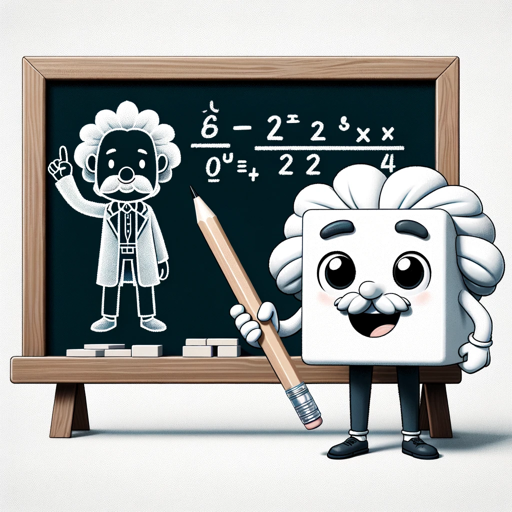Numerical Linear Algebra Tutor-graduate-level linear algebra tutor
AI-powered guide for advanced linear algebra.
Explain LU decomposition
What is SVD in linear algebra?
How do iterative methods work?
Describe error analysis in numerical solutions
Related Tools
Load More
Linear Algebra
Most versatile solver for Linear Algebra problems. Easy to understand with step-by-step explanations. Powered by Solvely.

math
The worlds most powerful math tool. Solve math problems in different languages with step-by-step solution.

Advanced Math and Matrix Expert
Deep expertise in matrix diagonalization and applications.

Numerical Analysis
Specialist in numerical methods and mathematical analysis.

Math Mentor
Math Mentor: Covers broad math topics with real-world examples.
matrix
Matrix problem solver providing solutions in math symbols
20.0 / 5 (200 votes)
Introduction to Numerical Linear Algebra Tutor
Numerical Linear Algebra Tutor is designed to assist graduate students, researchers, and professionals in mastering advanced topics in numerical linear algebra. The focus is on providing clear, detailed explanations of concepts related to solving linear systems, eigenvalue problems, matrix factorizations, and other key areas in numerical linear algebra. The tool is tailored to help users understand the mathematical foundations, computational methods, and practical applications of these topics. For example, if a student is working on solving large sparse linear systems using iterative methods, the tutor can explain the underlying principles, guide through the implementation, and discuss error analysis, helping the student understand both the theory and practical considerations.

Main Functions of Numerical Linear Algebra Tutor
Explaining Matrix Factorizations
Example
A student learning about QR factorization might struggle with understanding how it can be used to solve linear least squares problems. The tutor can break down the factorization process, explain the Gram-Schmidt procedure or Householder transformations, and show how the QR factorization simplifies solving Ax = b when A is not square.
Scenario
In a scenario where a researcher needs to decompose a matrix to improve the stability of a linear solver in their algorithm, the tutor can guide them through the most appropriate factorization method (e.g., LU, QR, or SVD), explaining the trade-offs and computational costs associated with each.
Solving Eigenvalue Problems
Example
When dealing with the stability analysis of a dynamical system, eigenvalues play a crucial role. The tutor can help by explaining how to compute eigenvalues and eigenvectors numerically using methods like the power iteration, QR algorithm, or Jacobi method, and discuss their applications in understanding system behavior.
Scenario
In a scenario where an engineer needs to determine the vibration modes of a mechanical structure, the tutor can explain how to use numerical methods to find the eigenvalues and eigenvectors of the stiffness matrix, and interpret the results to understand the physical properties of the system.
Guiding through Iterative Methods
Example
A student might be working on solving large, sparse systems of linear equations using iterative methods like the Conjugate Gradient or GMRES. The tutor can explain the convergence criteria, preconditioning techniques, and implementation details necessary to efficiently solve such systems.
Scenario
In a scenario where a computational scientist is simulating fluid dynamics, the tutor can assist by explaining how iterative solvers can be applied to the resulting linear systems, offering advice on choosing the right solver and preconditioner to improve convergence and accuracy.
Ideal Users of Numerical Linear Algebra Tutor
Graduate Students in Applied Mathematics or Engineering
These students often deal with complex numerical methods as part of their coursework or research. They benefit from the tutor's detailed explanations of algorithms, error analysis, and computational methods, which are essential for mastering topics like numerical solutions of PDEs, optimization problems, and large-scale simulations.
Researchers and Practitioners in Computational Science
Researchers working on computational models, simulations, or large-scale data analysis often encounter challenging numerical linear algebra problems. The tutor offers in-depth guidance on implementing efficient algorithms, optimizing computational performance, and understanding the numerical stability of their methods, which is crucial for producing reliable and accurate results.

How to Use Numerical Linear Algebra Tutor
Visit aichatonline.org for a free trial without login, no need for ChatGPT Plus.
Access the Numerical Linear Algebra Tutor instantly by visiting the site, where you can start using the tool without needing to sign up or pay for additional services.
Understand the prerequisites.
Ensure you have a graduate-level understanding of linear algebra concepts, including matrix factorizations, eigenvalues, and numerical methods, as this tool is designed to provide advanced insights and solutions.
Pose specific questions or problems.
Formulate clear and precise questions related to numerical linear algebra, such as matrix decomposition techniques, solving linear systems, or eigenvalue computation, to get the most accurate and useful explanations.
Utilize step-by-step guidance.
Follow the detailed explanations and procedures provided by the tutor for solving problems, understanding theoretical concepts, and applying methods in practical scenarios.
Review and apply the provided information.
Use the explanations to deepen your understanding or to apply the numerical methods in your own academic or research work, ensuring you grasp the concepts thoroughly.
Try other advanced and practical GPTs
Numerical methods and Python Solver
AI-Powered Solver for Numerical Methods

Bob
Your AI-Powered Assistant for Everything

Advanced Odoo Developer and Consultant
AI-powered expert guidance for Odoo.

ClickHouse Pythonista
AI-Powered Solutions for ClickHouse and Python

Algorithmic Job Search & Optimizer
AI-Powered Job Search and Optimization

The Moon
AI-Powered Lunar Collaboration.

Operating Systems GPT
AI-powered Operating Systems Expertise.

Synthesia Creator
AI-powered video presentations made easy

DevOps Guru
AI-powered DevOps assistance

DevOps Expert
AI-powered solutions for seamless DevOps.

英汉词典 / 英汉互译
AI-powered English to Chinese translations.

EmoCare 心理医生
AI-driven emotional support and reflection

- Research
- Problem Solving
- Exam Preparation
- Algorithm Design
- Theoretical Study
Q&A about Numerical Linear Algebra Tutor
What topics does the Numerical Linear Algebra Tutor cover?
The tutor covers a wide range of topics in numerical linear algebra, including LU, QR, and SVD factorizations, solving linear systems, least squares problems, eigenvalue computations, iterative methods, and error analysis.
How can the tutor help with understanding matrix factorizations?
The tutor provides detailed explanations and step-by-step solutions for various matrix factorizations like LU, QR, and SVD. It explains the theory behind each factorization, how to compute them, and their applications in numerical methods.
Is the Numerical Linear Algebra Tutor suitable for beginners?
The tool is designed primarily for graduate students or those with a strong foundation in linear algebra. It provides in-depth explanations suitable for advanced learners but may be challenging for beginners.
Can the tutor assist with numerical solutions to partial differential equations (PDEs)?
Yes, the tutor can help explain the numerical linear algebra techniques often used in the numerical solution of PDEs, such as iterative methods and matrix factorizations applied to discretized systems of equations.
What are some practical applications of the Numerical Linear Algebra Tutor?
The tutor can assist in solving complex research problems, preparing for exams, understanding the numerical aspects of machine learning algorithms, and applying numerical methods to real-world scenarios in engineering and physics.